#Chopin's piano and manuscripts
Text
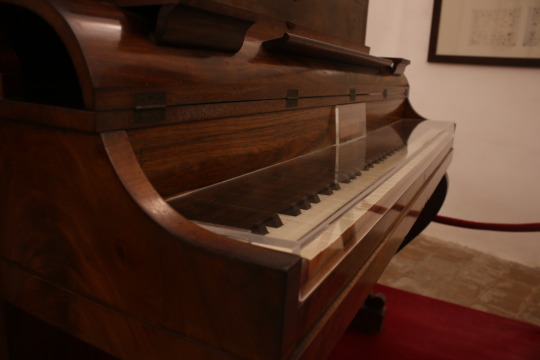
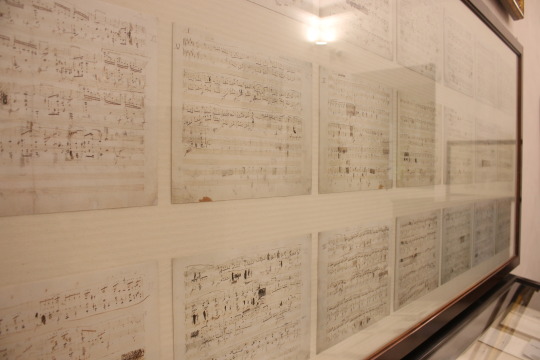
Chopin's piano and manuscripts, Cartoixa de Valldemosa, Valldemosa, Mallorca, 11-12-23
#Chopin's piano and manuscripts#Cartoixa de Valldemosa#Valldemosa#Mallorca#11-12-23#photography#photo#photographers on tumblr#aesthetic#aesthetics#vintage#victorian#1800s#classical music#piano#frederick chopin#chopin#classical composer#composers#george sand#dark academia
58 notes
·
View notes
Text



😍!
#chopin#fryderyk chopin#manuscripts#romantyzm#manuscript#notation#library#frederic chopin#classical music#piano music#polish music#composers#classical composers#romanticism#romantic music#romantic academia#19th century#pianist#dark academia#light academia#polonaise#mazurka#mazurek
65 notes
·
View notes
Text
My favourite piano piece ever is Chopin's Ballade no. 1 in G minor. There's plenty of amazing things about it, but one of my favourites which I keep thinking about is the combination of these two directions:

Appassionato, il più forte possible. With passion, as strongly (loudly) as possible. These two directions, while not written in one sentence, are almost creating a poem by themselves. Add to this the tense build up to the magnificent climax of the piece, and you get one of the most whole and beautiful phrases in the entirety of music history.
It also looks kind of amazing in the original manuscript:

In amongst tiny dotted notes and scraped ideas, lie two instructions.
Appassionato. Il più forte possibile.
They echo in my mind as if they were octaves themselves. Perhaps they are.
20 notes
·
View notes
Text
Soooo I went to FC Museum 🇵🇱 a while ago to visit Choppy.😍😘 (Again! After a few years!) These are some of my fav exhibits!
1. Chopin’s card to his father on his name day. 🥰 (6-12-1816)

Choppy’s drawings and handwriting when he was only 6 years old!!! 😳 (Omg I can’t even draw something like this when I was 16 lol)
2. Chopin’s letter to family in Warsaw. (6-7-1827)

Look at his beauuuuuutiful handwriting! 🖊️ ✨
3. Chopin’s manuscript of his Piano Concerto No.2 in F minor. (1829)

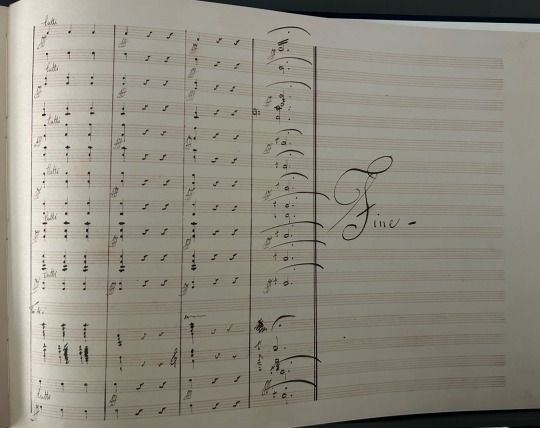
One of my favourite pieces! 💋
4. Chopin playing the piano, drew by Eliza Radziwiłłówny in 1826/1829.

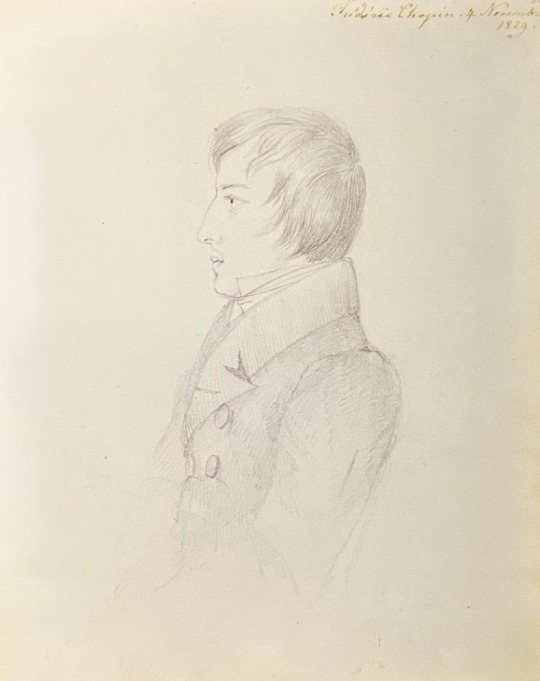
Teenage Chopin!!! How cute<3 UwU
5. Posters for Chopin’s concerts! (17-3-1830)

I’d literally do ANYTHING to be in there. 🥹🥺
6. Chopin’s manuscript of his Prelude in D minor. Op. 28 No. 24 (1839)

Tehehe so messy😆 Choppy sure didn’t want others to see the bars that he crossed out lollll
7. Chopin’s Buddha Bell.

Choppy used this bell to summon help during his final bout of illness. 🥹😢
8. Chopin’s bust made by Jean-Pierre Dantan. (1841)
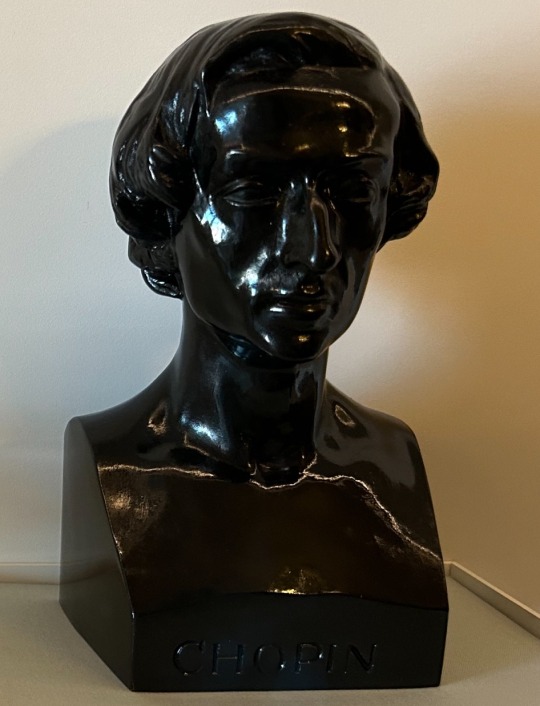
Choppy joked about this figurine in a letter to Julian Fontana:
'Don't send my little bust home, just leave it in the cabinet, because they might get scared'.
I actually think the little bust is cute!!
18 notes
·
View notes
Text
Music prodigy facts

Music prodigy facts full#
Music prodigy facts professional#
He produced his first compositions at five. Georges Bizet in 1875 Sergei ProkofievĪt four, he received his first lessons from his mother, and by aged thirteen he was accepted to study at the St Petersburg Conservatory, where he spent ten years. Bizet won several awards during his time at the Conservatoire, including the Prix de Rome. He came from a family of musicians, with both his mother and father talented in their own right. Maria and Teresa Milanollo Georges Bizetīizet was accepted at the Conservatoire de Paris at the age of nine even though it generally applied a minimum age limit of ten. She taught her younger sister Maria to play too, and she also emerged as a child prodigy. During her childhood, she also performed with Johan Strauss. Milanollo was born into a poor family and played concerts in several European countries, including Italy, England, and the Netherlands by the time she was ten. Portrait of young Vincenzo Bellini (1801-1835) Teresa Milanollo He went on to produce his first compositions when he was six. He began studying music theory at two and was playing the piano the following year. Frédéric Chopin at 19, by Ambroży Mieroszewski, 1829 Vincenzo BelliniĪccording to a hand-written history of Bellini’s early life, he was capable of singing an aria at eighteen months old. As a child performer, he was popular among the aristocracy in Warsaw, including grand duke Constantine of Russian Poland. His earliest surviving manuscript is from 1821 when he was eleven. Anonymous portrait of the child Mozart, possibly by Pietro Antonio Lorenzoni Frédéric ChopinĬhopin gave his first piano concert in Warsaw when he was seven, while at the same time composing his first pieces. His compositions quickly developed, and by eleven he wrote his first four piano concertos, including piano concerto no. He was playing the violin at aged four and wrote his first composition at five. Here are ten childhood prodigies who did just that.
Music prodigy facts full#
Even some musicians who began as child prodigies themselves have spoken out about the problems it can bring.īut on the other hand, it would seem unfair to restrict talented musicians from reaching their full potential.
Music prodigy facts professional#
Particularly given the gruelling challenges thrown up by the modern music industry, the impact that a professional career can have on children at such a young age continues to be a subject for debate. New ways have emerged for younger performers to reach a wide audience, such as the BBC’s young musician of the year awards run in Britain. If anything, recent years have witnessed a growing number of children showing off their musical abilities, and not only in classical music. The phenomenon is by no means confined to the past. As well as Mozart, undoubtedly the most famous young talent, several other renowned composers got an early start in their musical career, including Beethoven, Chopin, Liszt and Mendelssohn to mention just a few. Stories of child prodigies in the classical genre have a long history, going back to some of the greatest composers in the 18th and 19th centuries.

0 notes
Photo


First and last page (which apparently he used for cleaning the pen) of Chopin’s manuscript of the Polonaise-Fantasy, Op.61.
The piece was completed in August of 1846 and it was most likely composed in George Sand’s estate in Nohant.
It always makes me a bit sad listening to this piece, not because I find it sad, but because it is one of the last great works of his life and I feel that with this, (as well as with the magnificent Barcarolle which was composed in the same year) he was leading his music to a new, undiscovered path, that would have been wonderfully developed and explored had it not been for his untimely death.
Listen to this perfect masterpiece here, played by Vladimir Ashkenazy
#for a dying man this is incredibly vigourous#people never give him credit for that#he was literally withering away and coughing up blood and still he composed and played music with such energy#chopin#frederic chopin#fryderyk chopin#polonaise#piano#classical music#composers#19th century music#manuscripts#why do good people die young#he had still so much music inside him#it's so unfair
80 notes
·
View notes
Photo

F. Chopin, autograph manuscript quotation of the Étude op.25 no.1, 1844.
4K notes
·
View notes
Text
@hinatawa u did this to me. it was supposed to be a drabble but classical musician!akaashi has a special place in my heart now (also i threw in coworkers to lovers bcs i have zero self-control)

one of the first proper pieces that akaashi ever learned to play on the piano, was pachelbel’s canon in d.
a classic (or an awful cliche), he knows, but it was a popular request for weddings of his parent’s friends and therefore, according to bokuto, must have made him popular with girls. not that he really cared back then, but what was cuter than a 12 year old seated at an upright console, playing a little choppily because his little hands could barely stretch across the keys?
canon in d was relatively easy to play, anyway. it’s simple, familiar, a piece you can cadence at any time to fit the length of the procession. when people hear it, they think of weddings and romance and love.
not that a 12 year old cared for any of that. akaashi was still too focused on perfecting the technical aspects of the piano as the bride walked down the aisle and the flower girls bat their lashes at him. all he was thinking of were octaves and chromatic scale. trills and tremolos. he depended on muscle memory and the tick of the metronome to tide him through.
but then his parent’s friends had all gotten married, so the weddings stopped, and akaashi stopped playing canon in d. pushed it to the back of his mind as he moved on to master meticulous bach and grand tchaikovsky. grown up pieces that earned him standing ovations at recital finales and showcases by the time he was sixteen.
the manual dexterity earned from years of piano certainly helped as a setter. but even as he spent more time running around the court as opposed to seated in front of the ivory keys, the music followed him. unlike bokuto’s upbeat pop, liszt’s hungarian rhapsody no.2 blared through akaashi’s earbuds. it helped get him into the right headspace before games, with friska and the hamelian cadenza getting him just as pumped as bokuto after listening to taylor swift’s i knew you were trouble.
so, he might not have been playing actively or often anymore, but the music followed him. his fingers drummed elegant percussive on desk surfaces during idle study sessions, while bach and tchaikovsky got him through essay writing and exam prep.
now, chopin ballades get him through late nights at the office. nocturne plays softly from his earbuds as he reviews manuscripts and types up notes, easing some of the tension in his shoulders and making the editing process go a little more smoothly.
he sighs when the music pauses to let his phone ring, bokuto’s name flashing across the screen.
once he gets that straightened out, he’s about to hit play once more when his ears pick up what seems to be...piano music from next door.
your office is next door.
he tries to file through your conversations to see if you’d ever mentioned classical music, but comes up empty. it makes him like you even more, which, given his current, embarrassing level of infatuation, was saying something.
he doesn’t press play just yet, listening for a few moments more to try and identify the piece you’re listening to.
but akaashi can’t pick up more than the occasional sforzando, and curiosity leads him to set his earbuds aside and step out of his office, standing just outside your door, listening to the music as if he’s listening to you. it’s soft, gentle, romantic. something like gershwin, or perhaps debussy.
he’s still trying to figure it out when your door swings open, the both of you jolting back a step when you almost run into him.
“akaashi?” you breathe a relieved sigh, clutching a hand to your chest. “what are you doing here?”
oh, this is embarrassing. “i-- i needed someone to look over this for me.”
your eyes flick down to his empty hands before shooting him a questioning look.
he’s never been good at lying, so he sighs, running a hand through his hair. “i...heard your music through the wall.”
this time, you look embarrassed, smiling a little sheepishly. “oh, i’m sorry! I forgot my headphones and didn’t realize how loud it was. i’ll turn it off--”
you turn into your office, but akaashi shocks even himself when he catches you by the wrist. “don’t,” he insists. “i just...didn’t know you liked debussy, that’s all.” he holds up his phone. “I listen to chopin when i edit. keeps me in an even headspace.”
“huh,” you say, tilting your head in that charming way you do when you smile up at him. “how come i didn’t know this about you? you ever play?”
akaashi nods, hoping he doesn’t look as flustered as he currently feels. “when i was younger.”
“well, maybe you could play something for me sometime,” you suggest lightly.
the two of you stand there in the doorway for a moment, and he swears he feels your pulse skitter under his fingertips when he murmurs, “okay.”
-
akaashi’s parents moved their old piano into his apartment two weeks after he’d settled into it. it sits in his living room, ivory keys mostly untouched.
he tries to practice a little when he gets home, but for some reason can’t concentrate on the meticulous bach or grand tchaikovsky that he’d slaved over in high school. he can hardly even sight-read the newer pieces he’d intended to try. his measures and countings were off, his movements stuttered where they used to rip across the keyboard, playing liszt with ease.
he just couldn’t concentrate, not when debussy’s arabesque no 1 was stuck on a loop in his head. not when all he could think about was you, listening to it.
but he needs to practice so he doesn’t embarrass himself when you come over on saturday to listen to him play a bit (also for brunch, he needs to look up recipes and go grocery shopping).
so he takes a breath and tries again. something simple, familiar. pushed to the back of his mind, but still living in muscle memory.
canon in d.
it’s the first time he’s played it in years, but when he does, it’s easy. he’s not 12 anymore, so his fingers drift across the keys with a new sort of ease, the melody smooth like fine silk. it’s soft and sweet, simple compared to beethoven or debussy, but it makes him think of weddings and romance and love.
it makes him think of you.
270 notes
·
View notes
Link
An excellent article comparing the work of Johann Sebastian Bach and Frédéric Chopin, with notes on the style and creativity both composers brought to particular keys.
#johann sebastian bach#frédéricchopin#bach#chopin#bachinfluence#dailybach#welltemperedclavier#piano#pianist#virtuoso#musicscore#manuscript#composers#germancomposers#polishcomposers#musicblr
0 notes
Text
Impromptu


Chapter 6/17
Word Count: 1.9K
Genre: enemies to lovers, piano majors, series
Hyunjin x female reader ft. Stray Kids
Note: to those who are unfamiliar with classical music, it is recommended to give Impromptu Opus 66 (also Fantasy Impromptu) a listen as this chapter analyzes the elements within the piece. Feel free to give Appassionata a listen as well :)
You stared at your reflection in the mirror of the bathroom as you went to wash away the grime on your face. Your eyes were still a bit red and swollen, but they were better than earlier.
Thoughts about Kim Seungmin filled your mind. You had no idea whether you could face him again. And with Miyeon? Out of everyone, he just had to pick her?
Shaking your head, you stepped out of the bathroom, making your way towards the practice room. The sound from the piano became louder with each progressing step.
The door to the practice room was opened and Hyunjin was warming up with octave scales.
“All cleared up?” He asked.
You nodded.
“Yea. Let’s get started.”
With Hyunjin already seated at the piano, he performed first. You recognized the melody as soon as the first few notes resonated. The piece soon progressed forward, filling the room with the most delicate and expressive melodies.
You watched as Hyunjin’s fingers flew across the piano, caressing each note with utmost care. In sections where it was required to play loudly, you could feel his strength as he hammered away on each of the keys.
The way Hyunjin executed the piece was nothing like you have ever seen or heard before. You were envious of his large hands, the way he was able to effortlessly reach the largely spaced intervals. You, on the contrary, have smaller hands, which require you to utilize other methods to attain your notes.
Hyunjin’s footwork on the pedal matched perfectly with the flow music and he knew exactly where to make a change. You could barely detect the blurs and the extensive echos. Music seemed to be second nature to him.
“You really do love Chopin.” You said, as he ended on his final notes of the piece.
“I do. His music has the ability to touch our souls.”
Hyunjin stared off into space for a moment, admiring the melodies that still seemed to be lingering.
“Alright, let’s carry on. Your turn.” He said, snapping out of his daydream.
He looked up at you. There was a glimmer of mischief in his eyes, a complete contrast from the look that he gave you on the first day of your encounter.
Taking a seat at the bench, you performed a mental scan of which piece you would be playing and quickly decided.
Hyunjin’s eyes were on you the entire time you performed. You tried your best to connect your emotions to the style of the piece, allowing your fingers to work their magic. Like Hyunjin, your hands flew across the keyboard with clear runs and embellishments. You were aware of your footwork, changing the pedal every so often to minimize the extended effects of blurry echos.
Soon enough, you have reached the end of the piece with a final cadence. At the disappearing notes, your ears perked up from the sound of a single applause.
“You improved.” He said.
Hwang Hyunjin had complimented you, yet you were uncertain whether it was heard correctly.
“Did you just say what I thought you just said?” You asked, looking up at him.
“That you improved? You did much better than last time.” He responded.
“In what way?”
“Well, I could feel the musicality, the emotions, and the stuff that was not there last time. You played the same song, so it’s easy to distinguish.”
He took a seat next to you and demonstrated on the piano.
“Interesting that we picked the same piece that day.” You said. “I even have the exact same manuscript. The one with the faded blue cover.”
“Too much of a coincidence, don’t you think?” He asked, turning towards you.
“That was supposed to be our conversation starter, Hyunjin. I wanted to ask what piece you were playing but you were so mean to me.” You said, frowning while giving him a nudge.
“It was fun.” He commented nonchalantly.
“Excuse me?!” You exclaimed, irritated by his words.
He chuckled.
“Hey, I transferred not too long ago and was basically at war with everyone. They’re all my opponents.”
“Yea. What a great way to make an impression.” You said, rolling your eyes. “That’s probably just you. I’m never at war with anyone.”
“Yea right.” He scoffed.
“It’s true!”
“Then why were you crying so desperately earlier?”
You suddenly became quiet, filling the room with an awkward silence. Hyunjin shifted uncomfortably on the bench.
“Sorry. Shouldn’t have brought it up.”
“It’s, whatever.” You shook your head. “I’m just trying to forget everything that happened.”
You gave him a stern look.
“Pretend you saw nothing.”
The two of you sat a while longer in the practice room, deeply immersed in thoughts. Your eyes scanned across the room and eventually landed on the paintings that hung on the wall. Hyunjin seemed to notice the shift of your attention.
“You know the story that’s associated with Impromptu Opus 66?” He asked.
“Which story?”
Hyunjin nodded towards the painting of Chopin, amongst many other composers.
“His renowned love story with Madame Dudevant. At first, he really disliked her.”
“Ooh, that one.” You said in acknowledgement.
You studied the painting, taking in all of its details from the use of colours to the directions of the brushstrokes.
“And then she became the woman he loved the most.” Your voice faltered, as if you were almost absorbed into the story. The painting and the faint recall of melodies nurtured the atmospheric surroundings, rendering it to be almost a dreamlike romance.
“You know, it’s so interesting how their hate turned into love.” You said, curious and fascinated by the turn of events.
“Yea. And the fact that their love turned back into hate. It’s a pity that they separated in the end.” Hyunjin added.
You turned to look at him.
“Aw, look at you. Already so sentimental.”
You could see him roll his eyes.
"Every musician has a certain level of emotions." He said.
"Oh really? Hard to see it from your cold and arrogant exterior." You responded with a tone of mockery.
"Arrogant? Me?" He asked in fake innocence.
"Very." You answered with an emphasis, all too amused.
With that, the flames of a burning fire have disintegrated, as it awaits for an opportunity of rebirth. When the moment arrives, its transformation resembles the rising of a phoenix that is more than ready to take on new expeditions.
And that is the power of music. Its ability to transcend beyond the feelings of mutual hate and anger, replacing it with something that is much more worthwhile and meaningful. For the first time ever, a bond was forming between you and Hyunjin.
Your eyes returned to the painting.
“It does make sense, how the music reflected their story. It starts off intense, which portrays the arguments and the bickering during the initial dislike. Then a softer, more romantic central section emerges, symbolizing their love for each other. And finally, the bitter end that’s basically a repeat of the beginning.”
You paused for a moment before continuing.
“They were together for nearly ten years. That’s quite a long time.”
Hyunjin nodded.
“It really is. In comparison, romance these days barely lasts ten months.”
He looked at you with a raised brow.
“Ironic how our first Piano Battle was this very piece.”
Your eyes narrowed with suspicion.
“What are you trying to say?”
“Nothing.” He shrugged. “It happened to be brought up because you just played the piece and you performed much better than last time.”
You shook your head in disapproval, at how easily you could see through the situation.
“I know what you’re getting at. We were at each other’s throats before this pair up. And now, the department decided to play a game with some tricks, pairing us up into teams. It’ll make us temporarily less at war with each other, which brings us to the cantabile section where things are smooth and we kind of get along. Then at the final competition, we would be at each other’s throats again. I see how it is.”
As you analyzed the music with the situation, you had also debunked the idea of “random selection”. The department had determined the closest opponent of each student and strategically planned the pairings. That way, it would produce the most intense of battles. It was a purposeful selection that made perfect sense.
“We’ll let fate decide what happens.” Hyunjin responded.
His eyes then glanced over at the clock.
"Which reminds me, I have to get going."
He stood up and gathered his belongings.
“Well Y/N, it was great to work with you, but I gotta go pack for the holidays.”
He patted you on the shoulder.
“And I will be writing the dissertation over the break.”
“It’s not that long of a discussion, Hyunjin. Just a page.”
“There’s quite a lot to write about Y/N. They emphasized constructive criticism in that email. That is what I have to do.”
You rolled your eyes.
“I’ll most likely just get criticism without the constructive part even though you just said I was good a moment ago.”
His mischievous look returned.
“Good idea. Makes room for more improvement.”
You almost threw your water bottle at him.
“Hey, no violence allowed.” He said.
You stuck out your tongue at him.
“I can do whatever I want.”
Hyunjin zipped up his white winter jacket, which made him look even more like a weasel. The very thought had you bursting into laughter.
He gave you a look that was a combination of a side eye along with a slight face of disgust.
“What’s so funny?” He asked, annoyed at your reaction.
“Nothing.” You answered, still giggling to yourself.
You stood up and walked towards him to poke him in his jacket.
“It’s fluffy. You can wear it for Hallowe’en and pass for a weasel.”
Hyunjin’s jaw dropped.
You continued to giggle.
“Well, at least it’ll keep you warm. It’s gonna get cold later today.” You said.
“Yea. Winter is really here.” He gave you a small smile despite your sudden attack. “Don’t stay too long, yea? Get home before it gets cold.”
“I’m leaving campus tomorrow. Since I live far from here, I don't want to get home too late.”
“How long's the trip?”
“Five hours, give or take thirty minutes. There’s only so many trains a day that goes to where I am.”
Hyunjin nodded.
“Well, you take care. Enjoy your winter break and I’ll see you in the new year.”
The door closed behind him and you were alone in the practice room.
You pinched yourself to check if you were dreaming or hallucinating. Did you just have a rather pleasant conversation with Hwang Hyunjin? And that he was nice to you?
You knew that it had something to do with the pairing for the competition. Hyunjin had to do what he had to do to establish a cantabile moment. That sneaky weasel. But the conversation was rather genuine. And profound. He even made you smile.
Everything was so ridiculous. The fact that the person you had feelings for was the one who made you cry, but the one who you absolutely could not stand was the one who made you smile.
There was still a lot to anticipate. Until then, it truly was an odd combination of impromptu and irony.
#hwang hyunjin#stray kids#stray kids hwang hyunjin#hwang hyunjin stray kids#hwang hyunjin fanfic#hwang hyunjin scenarios#skz hyunjin#skz hwang hyunjin#stray kids seungmin#stray kids kim seungmin#skz kim seungmin#skz seungmin#stray kids fanfic#stray kids fic
11 notes
·
View notes
Text
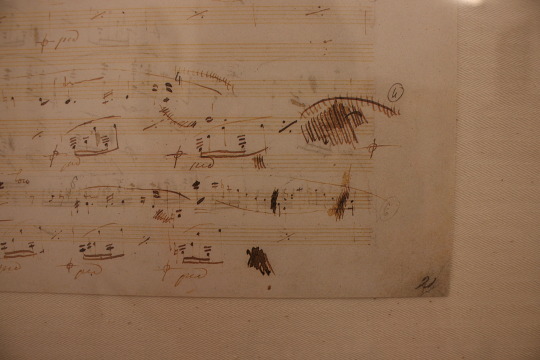

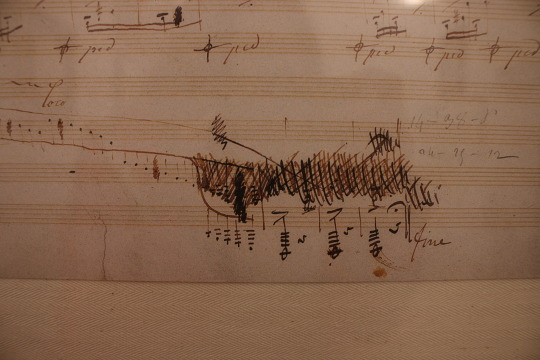
A composer's struggle, Cartoixa de Valldemosa, Valldemosa, Mallorca, 11-12-23
#frederick chopin#chopin#piano#classical music#dark academia#photo#photography#photographers on tumblr#aesthetic#aesthetics#vintage#manuscript#A composer's struggle#Cartoixa de Valldemosa#Valldemosa#Mallorca#11-12-23
59 notes
·
View notes
Link
happy 200th birthday, queen.
edit: the text, for anyone under paywall (below the cut):
Toward the end of her life, the opera diva Pauline Viardot took stock of her vast social network. She wrote a three-page, multicolumn list of everyone she had ever met, worked with or loved.
She ended up with over 300 names, a who’s-who of 19th-century icons: composers like Rossini, Liszt and Schumann; novelists like George Sand, Victor Hugo and Ivan Turgenev, her lover; Giuseppe Mazzini and Napoleon III.
Viardot entertained many of them at the weekly salons she held at her home in Paris. Classical musicians have rarely connected so widely with important figures of the day; the closest American parallel might be Leonard Bernstein, who hobnobbed with presidents and Hollywood glitterati.
But like Bernstein, Viardot — born exactly 200 years ago, on July 18, 1821 — was far more than a Zelig. One of the supreme singers of her time, she was also a prolific composer, whose music is slowly being salvaged from obscurity; a savvy entrepreneur; a gifted visual artist; and a highly respected voice teacher.
Born Michelle-Pauline-Ferdinande-Laurence Garcia, in Paris, Viardot was an heir to a musical dynasty. Her father, Manuel Garcia, was an international opera star and the first Count Almaviva in Rossini’s “The Barber of Seville.”
Born in Spain, Garcia never stayed in one place for long, moving his wife and three children — Viardot’s older sister, Maria Malibran, became another of the century’s reigning divas — to Italy, Paris and London. And then in 1825, when Viardot was 4, to the United States, where his family and troupe introduced Italian operas, sung in their original language, to the American public.
Viardot’s musical talents emerged early. She took piano lessons with Liszt and developed a girlhood crush on him. As a young woman, she played duets with Chopin, a friend. But when she was 15, her mother dashed her dreams of becoming a concert pianist, declaring that Pauline would pursue the family trade: singing opera.
She made her debut in 1839 in London as Desdemona in Rossini’s “Otello,” then hit her stride four years later when she brought the house down at the Bolshoi Theater in Moscow as Rosina in “The Barber of Seville.”
“Ravishing, velvetlike notes rang out, of the sort that no one, it seemed, had ever heard,” an audience member later recalled, adding, “Instantly an electric spark ran round the audience.”
When she was 18, she met and married the historian, art critic and theater director Louis Viardot, 21 years her senior. In a reversal of gender norms, he resigned from his post as director of the Théâtre Italien in Paris after their wedding to focus on Pauline, her career and, ultimately, their four children.
With a voice of uncommon range and flexibility, Viardot became famous on Europe’s major stages in signature roles that included Zerlina and Donna Anna in “Don Giovanni,” Adina in Donizetti’s “L’Elisir d’Amore” and the title role in Bellini’s “Norma.”
“Her technical skill alone is immense; in the completeness of her chromatic scale she is, probably, without a rival,” said an article published in Fraser’s Magazine, a London journal, in 1848.
But, the writer went on, “the principal feature which characterizes her is the dramatic warmth of her impersonations. She throws herself heart and soul into a part.”
Composers sought her out for important premieres: She was the first Fid��s in Meyerbeer’s “Le Prophète” and Charles Gounod’s first Sapho. When Berlioz resurrected Gluck’s “Orfeo” for the Parisian stage in 1859, Viardot was the diva for whom he rewrote the title role. A decade later, Brahms chose her as the soloist for the premiere of his Alto Rhapsody.
After retiring from the opera stage in 1863, Viardot continued singing in concerts and being what we’d call today a macher. She owned the original manuscript of Mozart’s “Don Giovanni,” which composers including Fauré and Tchaikovsky made pilgrimages to see. In 1869, she wrote an effusive letter to Richard Wagner congratulating him on a performance of “Die Meistersinger.” But his notorious anti-Semitic essay, “Judaism in Music,” published under his name the following month, soured the relationship, and Wagner and his wife, Cosima, began referring derisively to Viardot as a “Jewess.” (She was not Jewish.)
Following her father, who was a gifted composer as well as a brilliant singer, Viardot put significant time and energy into composing. Her work is not nearly as widely known as that of Robert Schumann, Liszt, Saint-Saëns or others in her social circle. But her music was deeply appreciated by her contemporaries, with one person going so far as to compare her talent to Schubert’s. Clara Schumann referred to her as “the greatest woman of genius I have ever known.” A fierce advocate for her students, she died, just a month shy of her 89th birthday, in 1910.
Today, her works are enjoying a resurgence among scholars and performers — part of a wave of interest in long-neglected composers like Amy Beach, Florence Price, Clara Schumann and others.
Viardot wrote hundreds of pieces, the majority of them songs for solo voice and piano. Her first was “L’Enfant de la montagne,” published when she was just 19 in a collection organized by Meyerbeer, Paganini and Cherubini. Like so many of her songs, she was its major advocate, using it to show off her vocal skills in concerts in Leipzig, Germany, and other cities.
Her songs have more recently become popular fare for prima donnas including Annick Massis, Cecilia Bartoli and Aude Extrémo. They range from playful and virtuosic (“Vente, niña, conmigo al mar”) to hauntingly beautiful (“L’Enfant et la Mère” and “Hai luli”). The publisher Breitkopf und Härtel has released a new critical edition of some of the songs on texts by Pushkin, Fet and Turgenev. (Viardot’s Russian was superb.) She also wrote works for piano and violin, the instrument of her son, Paul Viardot. Her other three children, also musicians, performed her compositions, too.
True to her specialty, Viardot also wrote operas. These were mostly performed by her students and children in her home, with piano accompaniment, but at least one, “Le Dernier Sorcier,” was orchestrated and performed in 1869 in Weimar Germany.
Wolf Trap Opera in Virginia has revived her “Cendrillon” just this weekend. Viardot wrote both the music and words for this chamber operetta about Cinderella, a fanciful interpretation of the fairy tale by Charles Perrault.
“Her music is both challenging and wonderfully singable,” Kelly Kuo, the production’s conductor, said in an interview. “You just know that it was written by someone who really understood what she was doing.”
Among the guests at the 1904 premiere of “Cendrillon” were the editor and musician Salvatore Marchesi and his wife Mathilde, an influential voice teacher. Finding Viardot’s music charming, they wrote of their certainty that it would have “a successful run through the world.” Although somewhat delayed, their prediction is perhaps beginning to come true.
“Viardot,” Kuo said, “is a perfect example of an artist who should be much better known today.”
#Pauline Viardot#Pauline Viardot-Garcia#happy birthday#composers#women composers#classical music#opera#opera tag#divas#a true queen
22 notes
·
View notes
Photo
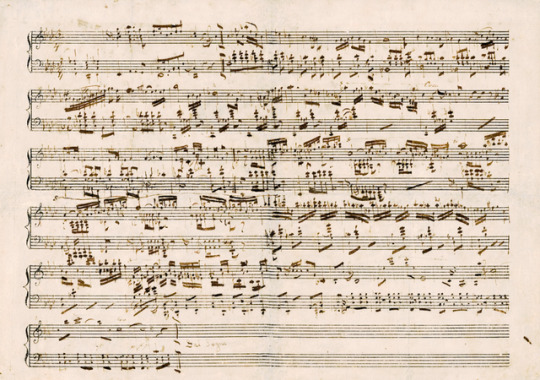
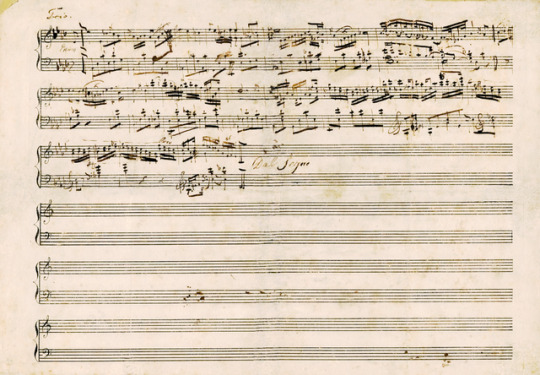
Manuscript of Chopin’s Polonaise in F Minor, Op. 71, No. 3, ca. 1828-29.
8K notes
·
View notes
Text
Forgotten Music
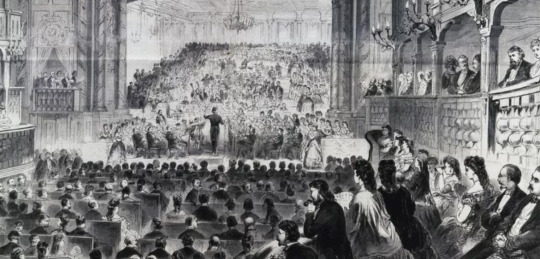
“I really don’t know whether any place contains more pianists than Paris, or whether you can find anywhere more asses and virtuosos. Is there a difference?”
Probably my favorite quote from Chopin, he’s talking about how many virtuoso pianists were living in Paris at the time he moved there in 1830. It’s regarded today as the flying trapeze school of piano playing, since all the pianists at the time were fixated on who could play the fastest, hit the piano the loudest, and preform all kinds of tricks and stunts for vying audiences. Chopin, obviously wanted nothing to do with this.
It was customary at the time for a virtuoso pianist to not only play other peoples work, but also compose their own. It’s surprising how much of this music has been forgotten. Schumann, Chopin, Liszt, some Mendelssohn, everyone else’s piano pieces from around this time are hardly ever played, if ever played at all; and probably for good reason, as a lot of the music was likely bad. But it makes you wonder if there are any hidden gems out there.
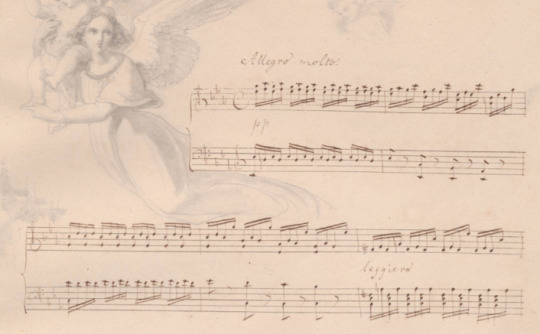
Manuscript of Fanny Hensel’s Das Jahr - December
My favorite “forgotten” piece of music from this time is Fanny Hensel’s Das Jahr (The Year). Written in 1841, it consists of twelve pieces named after each month of the year. For various family reasons, and prejudice against women composers during this time, she never published the work and we didn’t even know it existed until 1989, 150 years after it was written! Even now, you can only find a few pianists who have recorded it, which is a shame, because it’s an incredible piece, dwarfing anything her famous brother wrote for the instrument.
Another female composer I’ve been listening to from around this time is Louise Farrenc. I first heard her through Sharon Su who recorded one of her etudes last year.

Drawing of Louise Farrenc
Wanting to hear more of Farrenc’s work, I scrolled through her list of compositions on Wikipedia, though it was difficult to actually hear them, as a lot have never been recorded. There aren’t even videos on YouTube of people playing these pieces at home.
It’s an interesting experience taking the sheet music and playing through them on piano. Since there aren’t any recordings, you have no idea what it sounds like until you start playing the notes. But there’s something special about playing through a piece written 150 years ago that’s never been recorded. You sort of feel like an archeologist digging up ancient remains of a dinosaur, and can’t help but wonder “when was the last time someone actually heard this music?”
I wonder.
3 notes
·
View notes
Photo

Frédéric Chopin (1810–1849)
Etude for Piano in C Major, op. 10, no. 7
Autograph manuscript, 1832
2K notes
·
View notes
Text
At Fryderyk’s deathbed
Rumours had began to spread in Paris that Fryderyk was dying. And so his appartment at No. 12 place Vendôme was filled with dozens of people; friends, who came to say farewell, pupils, to thank him while he encouraged them one last time, and a great number of mere aquaintances, who simply called in as a mark of respect. Fryderyk would hold a brave face while talking to them, but as soon as they left, he couldn’t hide his suffering anymore. His gasping breaths were hardly more than pitiful, stifled cries, horrifying sobs.
George Sand sent me a letter, in which she asked about Fryderyk’s condition. But the tone of the letter was ill-judged and jarring, filled with pompous insults and assumptions of ”motherly rights“, speaking of Fryderyk like a child who had abandoned and forgotten his mother. I never answered the letter.
It was important to Fryderyk to sort out his affaires befare he died, so he gave us careful instructions. He asked that all unfinished musical manuscripts in his portefolio must be destroyed, and that only completele pieces should be published. He asked that Mozart’s Requiem would be sung at his funeral. And he implored that his body would be cut open, so that he would not be buried alive, and that his heart would be brought back to Poland, where it belongs.

Delfina Potocka arrived from Nice the 15th of October to visit Fryderyk. He was moved by this gesture, and begged her to sing for him one last time. She obliged, and sang to him, accompanied by the piano that we rolled up by the bedroom door.
When the 16th came, Fryderyk asked again for music, so Princess Marcelina and Auguste Franchomme played him some Mozart. After they had finished, he asked them to play his own Sonata for Piano and Cello. But only after a few bars of this he began to suffocate, so they had to stop.
By now, most of the callers had gone, leaving only intimate friends. We spent the evening reciting litanies. Fryderyk was silent. Later, two doctors came to examine him. One of them took a candle and held it before Fryderyk’s face, who had become dark with suffocation. The doctor remarked that his senses had ceased to act. But when he asked Fryderyk if he was suffering, we quite distinctly heard his answer: ”No longer!“

The night came, and more people left, leaving only me, Princess Marcelina, Gutmann, Thomas Albrecht and Solange. The 16th became the 17th when midnight passed. It was silent. Around two o’clock in the morning, I had fallen asleep, but Fryderyk lay awake. Solange sat beside him, holding his hand.
”Don’t stay here, this will be ugly“, he suddenly said to her. ”You must not see it.“ He appeared to have a seizure, so the terrified Solange called Gutmann, who ran over and took Fryderyk in his arms. I woke. We wanted to give him a drink, but death prevented us.
”He passed away with his gaze fixed on me, he was hideous, I could see the tarnishing eyes in the darkness“, Solange later wrote. ”Oh, the soul had died too!“
Fryderyk Chopin, my dear brother, had passed away, after years of sickness and suffering. On the following day, the doctor came to carry out an autopsy, and Auguste Clésinger came to make Fryderyk’s death-mask. I was heartbroken; my world had fallen into darkness, but I stayed in Paris for several months in order to arrange his funeral and sort out his affaires. And when I finally returned to Poland, I brought Fryderyk’s heart with me home.
”The soul of an angel, cast down upon earth in a tortured body in order to accomplish some mysterious redemption“, was how Solange remembered him. ”Is it because his life was a thirty-nine-year agony that his music is so lofty, so sweet, so sublime?“ she wondered.
#fryderyk chopin#frédéric chopin#at fryderyk’s deathbed#death#sickness#ludwika chopin#george sand#delfina potocka#princess marcelina#auguste franchomme#gutmann#thomas albrecht#solange#auguste clésinger#october#17. October
91 notes
·
View notes